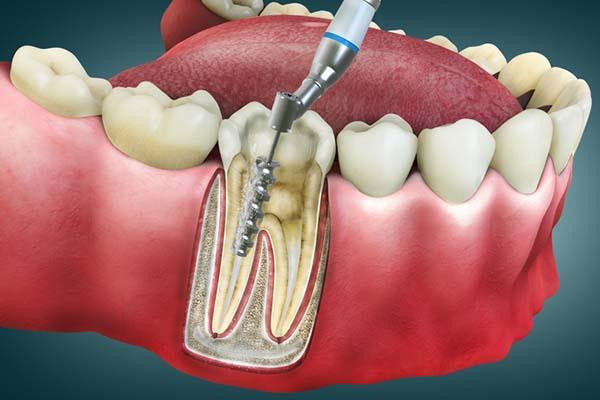Root canal treatment is a standard dental procedure aimed at treating issues within a tooth’s pulp. The goal is to save the natural tooth, which is beneficial for maintaining proper chewing function and a natural appearance. Without treatment, the infection can spread, leading to an abscess or tooth loss. Here is more information on what root canals are and the reasons a dental professional may recommend them:
What Are Root Canals?
Root canals are dental procedures designed to treat infection and inflammation within the pulp of a tooth. The pulp is the innermost part of the tooth, containing nerves, blood vessels, and connective tissue. When this area becomes damaged, a root canal is performed to save the natural tooth.
This treatment involves removing the infected or inflamed pulp, cleaning and disinfecting the inside of the tooth, and then filling and sealing it. A general dentist performs the procedure, and it can prevent the need for tooth extraction and restore the tooth’s function. Knowing what to expect from the procedure helps facilitate a smooth experience.
Why Are They Conducted?
Dentists recommend root canals to treat deep decay, cracks, or chips in the tooth. These situations lead to bacteria entering the pulp, and if left untreated, they can cause pain or lead to an abscess. Symptoms that may indicate the need for a root canal include severe tooth pain, prolonged sensitivity to heat or cold, and tenderness to touch and chewing. Swelling of the gums and tooth discoloration are other common signs of pulp damage.
What Does the Procedure Involve?
The root canal procedure is typically performed under local anesthesia. The dentist first places a rubber dam around the tooth to keep it dry and free of saliva. An access opening is then created in the crown of the tooth to reach the pulp chamber. Using small instruments, the dentist removes the damaged pulp from the pulp chamber and root canals.
The inside of the tooth is cleaned, shaped, and disinfected to remove any remaining bacteria. This step prepares the tooth for the filling material. Once the tooth is thoroughly cleaned, it is filled with a rubber-like material, and the access opening is closed with a temporary or permanent filling. This process seals the tooth from further infection.
What Happens After?
Following a root canal, it is normal to experience some sensitivity and tenderness for a few days, so over-the-counter pain medication may be used to help manage any discomfort. Avoid chewing on the treated tooth until it is fully restored to prevent it from breaking. Good oral hygiene, including brushing and flossing, is also beneficial.
What Are the Benefits?
The primary benefit of a root canal is that it saves the natural tooth, which helps maintain proper chewing function and normal biting force. It also preserves the natural appearance of the smile. This treatment can last a lifetime with proper care.
A root canal also relieves the pain associated with an infected tooth and stops the spread of infection to other areas of the mouth. By choosing a root canal, individuals can avoid the need for tooth extraction and more complex dental work, like bridges or implants. This makes it a practical solution for preserving oral health.
Know What To Expect
If you are experiencing symptoms that suggest you need a root canal, consult your dentist. They can perform a thorough examination and determine the most appropriate course of action for your oral health. Schedule an appointment now to discuss your options.





